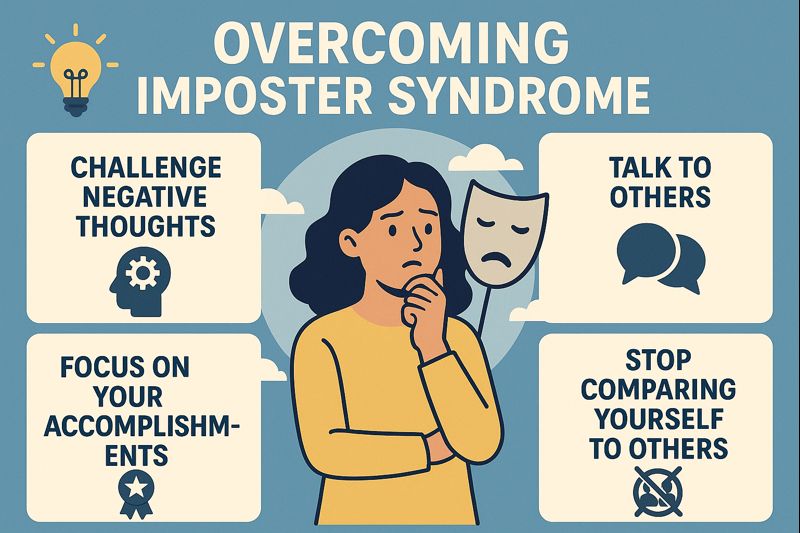If you’ve ever caught yourself second-guessing your accomplishments, feeling like a fraud among colleagues, or worrying that someone might call you out for not being as skilled as you appear, you’re certainly not alone. Imposter syndrome often creeps in for people at all levels—from students just starting to seasoned professionals leading the way. That sense of “not belonging” is much more common than you might think, but the good news is there are practical ways to deal with it. This article breaks down the roots of imposter syndrome and shares strategies to help anyone get past it and feel more confident in what they have to offer.
Understanding Imposter Syndrome and Its Impact
Imposter syndrome is when someone doubts their skills, talents, or accomplishments—even when there’s plenty of proof they’re doing well. For many people, it pops up as negative self-talk, anxiety before presentations, or the idea that luck was the main reason for their wins. Research from the International Journal of Behavioral Science estimates that about 70% of people have imposter syndrome at some point in their lives.
These feelings can prevent people from applying for jobs, speaking up in meetings, or celebrating achievements if left unchecked. It’s helpful to determine where these feelings come from. Sometimes, they stem from perfectionism, cultural expectations, or jobs that don’t feel welcoming. Knowing you’re not alone with these thoughts can make a noticeable difference in how you deal with them.
Getting Started: Recognizing Your Own Patterns
The first step to handling imposter syndrome is to spot how it appears in your life. It sneaks in through everyday situations, so staying aware is useful. Once you know your own triggers, it gets easier to break the pattern.
- Perfectionism: The belief that you need all the answers or can’t make any mistakes to be worthy of your spot.
- Discounting Success: Dismissing your achievements as luck or timing instead of seeing your own effort.
- Comparing Yourself to Others: Feeling like everyone else has it together while you’re making it up as you go.
- Overworking: Clocking extra hours to “prove” you are good enough, no matter your results.
Journaling your thoughts or tracking when these patterns show up can help you spot and manage them more easily. You might even notice trends in when or how imposter syndrome kicks in, like after tough meetings or in the face of new challenges.
Quick Guide: Strategies for Steering Through Imposter Feelings
Dealing with imposter syndrome isn’t about hiding your self-doubt or pushing through by sheer willpower. It’s about building healthier habits and mindsets. Some steps take time, but everyone nudges you closer to absolute confidence.
- Challenge Negative Thoughts: When you think you’re out of place, pause and ask: “What’s the real evidence here?” Write down achievements and strengths that show otherwise.
- Talk with Trusted People: Checking in with a mentor, friend, or supportive coworker can give you a new perspective. You’ll often find they’ve worried about the same things.
- Practice Self-Compassion: Don’t be your own harshest critic. Offer yourself the same kindness you’d give to a struggling friend.
- Keep an Achievements List: Start a notebook or digital doc where you track big and small wins. This log becomes powerful proof whenever doubt creeps in.
- Set Realistic Goals: Mistakes are part of learning, not signs you’re a fraud. Welcome them as proof that you’re growing.
Together, these steps help you overcome self-doubt and focus on what you bring. It’s not about pretending to be confident. It’s about slowly building up the evidence and self-acceptance that lets you feel it.
Hurdles to Watch for Along the Way
Moving past imposter syndrome is a process, and there are common roadblocks you might hit. Spotting them ahead of time helps you deal with them more effectively.
- Moving Goalposts: You keep raising your standards so that no amount of achievement feels enough.
- Fear of Messing Up: The idea of failing makes you hesitate to try new things or speak up.
- Comparisons: Social media can make other people’s wins look effortless, turning up the pressure.
- Echoes of Old Messages: Sometimes comments from your past—maybe from teachers, family, or old bosses—still echo in your head today.
Moving Goalposts
Every time you reach one goal, you might feel like you must immediately set the next, more challenging goal, never letting yourself pause to celebrate. Appreciating what you’ve already done can help you reset this habit.
Fear of Messing Up
Everyone stumbles now and again, but fearing mistakes can stop your growth. Try looking at each setback as a lesson, not proof you don’t belong. Mistakes are part of the process and stepping stones to expertise.
Comparisons
Scrolling through highlight reels often makes it seem like everyone but you is thriving. Remember, you’re seeing only polished moments. Bringing things back to your progress can help you stay grounded and motivated.
Echoes of Old Messages
If someone ever told you that you’re not “good enough,” those ideas can stick. Recognize which stories are yours and which you’ve picked up from others. Reframing these beliefs is key to making room for your true self.
When you face these hurdles with self-awareness and some practical tools, you can keep moving forward. Every stumble allows you to practice new skills and build lasting resilience.
Leveling Up: Deeper Approaches to Quiet the Inner Critic
Once you start recognizing and challenging your basic patterns, try some advanced ways to dampen imposter syndrome’s hold.
Mentorship: A mentor isn’t just someone to give you work tips—they can also remind you of your growth, help you see things in a new light, and offer honest feedback. Seek someone encouraging and open to sharing their own struggles, too.
Reframe Setbacks: When things go sideways, ask: “What can I learn from this?” Setbacks aren’t signs you’re not cut out for your role—they’re opportunities to gain wisdom and perspective.
Limitations Become Strengths: What might feel like a weakness could be your secret weapon. Being new may help you notice something invisible to longtime team members. Let your unique background shape great ideas.
Professional Guidance: If imposter feelings overwhelm work and life, talking with a counselor or therapist can help. They offer personalized support and coping tools.
The more you try these strategies, the lighter imposter syndrome will feel. Over time, you’ll see that you belong, and your perspective brings real value.
Where Imposter Syndrome Shows Up (and How to Make the Most of It)
People across all fields—college students, bestselling authors, and experienced doctors—have discussed imposter feelings. They can hit anyone, regardless of achievement or experience. The key isn’t erasing those thoughts. It’s acting with courage anyway.
- At School: You might wonder if you deserve your grades or your spot on a team.
- At Work: Imposter syndrome often shows up with new projects, interviews, or transitions.
- In Creative Fields: Artists, writers, and musicians often second-guess their originality or worry they’re just copying someone else.
Sometimes, these feelings signal stretching and growing outside your comfort zone. Use that energy as motivation to learn more, not as a reason to hold yourself back.
Imposter syndrome is even present among award-winning scientists and successful entrepreneurs. If they feel doubt and want to keep going, you can too. Try to find stories of people you admire who’ve faced these challenges. Realizing how common these feelings are can help you normalize—and overcome—them.
Frequently Asked Questions
Here are some common questions about imposter syndrome and practical answers you can immediately put to work.
Question: Is imposter syndrome just another word for low self-esteem?
Answer: No, although they sometimes overlap. Imposter syndrome typically appears around achievements or work, while low self-esteem is a broader concern about your value.
Question: Can imposter syndrome ever disappear for good?
Answer: It comes and goes for most people, especially when faced with new opportunities or challenges. What’s important is learning to manage it so it doesn’t stand in the way of your progress.
Question: What small step can I take right now to feel better?
Answer: Write down a few recent wins—big or small. Listing out your successes, no matter how minor they seem, helps remind your brain that you are capable. That can give your confidence a quick lift.
Final Thoughts
Imposter syndrome tries to convince you that you’re not qualified, or that your success is just luck. You can slowly change your mindset by recognizing these feelings and building up practical tools. You’ve already proved you belong—sometimes your mind needs proof. Keep challenging unhelpful thoughts, write down your wins, and reach out for support when you need it. You’re not alone; those feelings don’t have to run the show.
Video: What REALLY Causes Imposter Syndrome?

